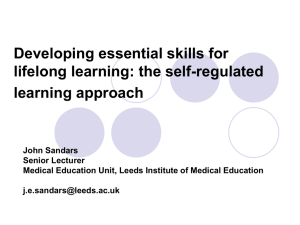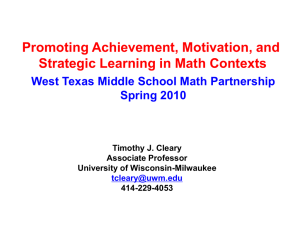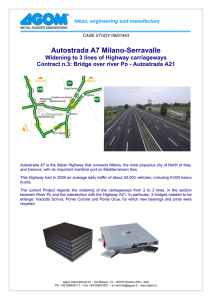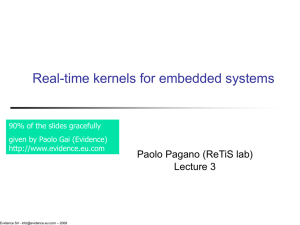Teacher
advertisement
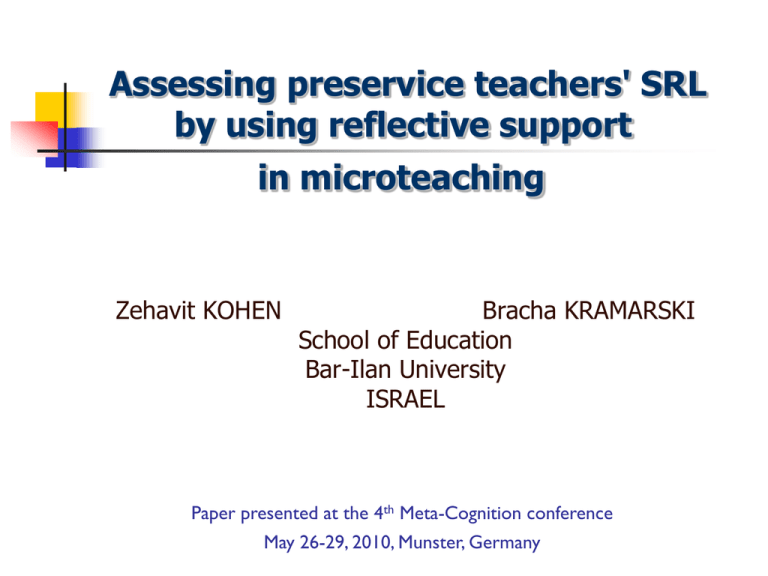
Assessing preservice teachers' SRL by using reflective support in microteaching Zehavit KOHEN Bracha KRAMARSKI School of Education Bar-Ilan University ISRAEL Paper presented at the 4th Meta-Cognition conference May 26-29, 2010, Munster, Germany Assessing preservice teachers' SRL by using reflective support in microteaching SRL- Essential for teachers' professional growth as learners and teachers. Current Study 1st Objective: Enhancing SRL by using different supports SRL at preservice teachers Meta-Cognition Cognition Motivation pedagogical Context Context Butler, 2005; Pintrich, 2004; Schraw, 2006; Zimmerman, 2000 Assessing preservice teachers' SRL by using reflective support in microteaching SRL- Essential for teachers' professional growth as learners and teachers. A need to assess online changes in SRL in real time and within authentic contexts. Current Study 1st Objective: Enhancing SRL by using different supports Current Study 2st Objective: Assessing SRL by using complementary measures pedagogical Context Microteaching training Video-recorded teaching experiences, followed by reflective discussions. Fostering reflection for promoting SRL Scaffolding for SRL- two perspectives Self regulated learning can be enhanced when learners explain instructional materials to themselves (e.g., Aleven & Koedinger, 2002; Renkl 2002) Self-Regulation Support (SR) Self regulated learning can be enhanced when learners share their regulation reciprocally (e.g., Kramarski & Mevarech, 2003; Palincsar & Brown, 1984; Salonen, Vauras & Efklides, 2005) Co-Regulation Support (CR) Method Participants and Procedure 88 preservice high school teachers from different knowledge fields. Microteaching training: 12 weekly pedagogical workshops lasting two hours each, 24 hours of training in total. Two groups: Co-Regulation Support (CR) and Self-Regulation Support (SR). Training CR SR Co-Regulation Support Self-Regulation Support Microteaching Fifteen minute of teaching training Reflective pedagogical discussions (also in forums) ExplicitTheoretical instruction models of SRL of SRL Practice PromptsSocial for SRL level Individual level during (reflection sharing in peers) Training- Explicit instruction An example of an exercise in order to practice how to increase motivation, which is a component of SRL: How is the motivation of the teacher realized in the following part of the movie: dead poets society? Training- Explicit instruction Prompts were given in flashcards, used to facilitate the reflection to be directed to SRL components Meta-cognition: monitoring “During teaching, the Meta-cognition: planning “The teacher needs to give teacher needs to ask himself occasionally whether he is acting properly” thought for planning the lesson by setting specific goals for the lesson or by setting a logical sequence for the content” Motivation: Motivation: teaching anxiety “During teaching, the teacher should find calmly the right words to express thoughts” interest and value “Perceive teaching as challenging is important for the teacher” Assessing SRL Two different measures Aptitude/Offline measures • The learner reports the use of SRL components before, after or independent of learning situation, e.g. self-report questionnaires (*) (*) MSLQ: Pintrich, Smith, Garcia, & McKeachie, 1993 MAI: Schraw & Dennison, 1994 Assessing SRL Two different measures Event based learning/Online measures • Assessing online changes in SRL in real time and within authentic contexts e.g. Think-aloud protocols (*) Trace Logs (**) Observations (***) (*) (**) Winne, Azevedo, Moos, Winters, & Cromley, 2008 Nesbit, Kumar, Hadwin, Lajoie, Azevedo, et al., 2006 (***) Perry, Vandekamp, Mercer, & Nordby, 2002 Assessing SRL Two different measures Observations in real time during teaching experiences pre-post questionnaires Assessment MeasuresA Coding Scheme A coding scheme was developed (Schraw et al., 2006 and Pintrich et al., 1991). Validity: agreement on content of categories between expert judges. Coding systems were classified, as low (1), medium (2), high (3), or absence (0), well defined and justified by examples. Reliability: Inter-judge reliability (r=.89). Assessment MeasuresA Coding Scheme By reproducing the video-taped observation, statements and behaviors were examined and coded by their attribution to the SRL skills. Meta-Cognition Planning Motivation Interest and "Teaching as a vision" Stating lesson goals, logical Valuesequences of lesson components Involvement in the lesson and Using common sense whilst dealing with content, exhibition of confidence learning materials and accessories, and timing Teaching Lack of cognitive, emotional and behavioral Anxiety Summary of lesson, dealing with the achievement of reactions lesson goals and students' understanding Self-efficacy Monitoring Evaluating (Schraw et al., 2006 and Pintrich et al., 1991) The Coding Scheme- Evaluating Criterion Meta-Cognition Summary of lesson, dealing with the achievement of lesson goals and students' understanding Evaluating Criteria Level 0- absence 1- low Meta-Cognition Evaluating Summary of lesson and dealing with students' understanding Referring the achievement of lesson goals Note: 30% of data were analyzed by two judges. 2- medium 3- high The Coding Scheme- Evaluating Criterion Criteria Level 0- absence 1- low Missing Summary of summary lesson and dealing with students' understanding Meta-Cognition Evaluating Referring the achievement of lesson goals Missing reference to lesson goals 2- medium 3- high The Coding Scheme- Evaluating Criterion Criteria Level 0- absence Missing Summary of summary lesson and dealing with students' understanding 1- low General summary , without dealing with students' understanding Dictating a summary to the students Meta-Cognition Evaluating Referring the achievement of lesson goals Missing reference to lesson goals General reference to lesson goals, without details "Later we will see how what we have learned connects to each other" 2- medium 3- high The Coding Scheme- Evaluating Criterion Criteria Summary of lesson and dealing with students' understanding Level 0- absence 1- low 2- medium Missing summary General summary , without dealing with students' understanding Summary of lesson and dealing with students' understanding, but not through all the lesson, OR: General summary without insights Dictating a summary to the students "Today we learned…" General reference to lesson goals, without details Detailed reference to the achievement of lesson goals, but without future implication "Later we will see how what we have learned connects to each other" "Let's mention what we have learned in order lesson goals will be clear" Meta-Cognition Evaluating Referring the achievement of lesson goals Missing reference to lesson goals 3- high The Coding Scheme- Evaluating Criterion Criteria Summary of lesson and dealing with students' understanding Level 0- absence 1- low 2- medium 3- high Missing summary General summary , without dealing with students' understanding Summary of lesson and dealing with students' understanding, but not through all the lesson, OR: General summary without insights Summary of lesson and dealing with students' understandin g through all the lesson, OR: General summary with insights Dictating a summary to the students "Today we learned…" Clarification of new concepts taught in class; Asking the students to define those concepts General reference to lesson goals, without details Detailed reference to the achievement of lesson goals, but without future implication Detailed reference to the achievement of lesson goals, with future implication "Later we will see how what we have learned connects to each other" "Let's mention what we have learned in order lesson goals will be clear" "In the next lessons we will continue what we have started today. It's a part of a few classes array" Meta-Cognition Evaluating Referring the achievement of lesson goals Missing reference to lesson goals Results analysis of the Coding Scheme EXAMPLES of lesson, dealing with the achievement Evaluating Summary of lesson goals and students' understanding “Teacher- Yael” (SR support) • Yael (After a discussion at class): “you have said many definitions. Let's summarize together the definitions” (looks at the class for a short while, notice the students don't answer and summarize the definition) “Teacher- Avital" (CR support) • Avital: “So… basically here, we have an example where it's obvious and it's clear that we have a cause and effect relationship. Again, how do we know it?” (encouraging sharing knowledge) • preservice teachers: (answer the question, which summarize what’s taught so far) Results analysis of the Coding Scheme EXAMPLES common sense whilst dealing with content, Monitoring Using learning materials and accessories, and timing “Teacher- Yael” (SR support) “Teacher-Avital" (CR support) • Yael: “Now, I hand out to you flashcards. I want you to read and discuss it” • Yael (doesn't wait for the class to discuss and says) “So, who is ready to read first what's written and we will discuss it together?” (points at a student to read, instead of letting the student to volunteer to read) • Avital: (speaks to a student) “Please read the title in the work sheet” • Preservice teachers: (reading unfluently) • Teacher: (stops the lesson when noticing misunderstanding and says) “I must make an introduction” Results analysis by the Coding Scheme EXAMPLES in the lesson and exhibition of Self-efficacy Involvement confidence “Teacher- Yael” (SR support) “Teacher- Avital" (CR support) • Teacher: “More ideas?” (looks and points with his finger at the class) • Preservice teachers : (no comment) • Teacher: (looks at her papers and not at the class): “more ideas?” • Preservice teachers : (no comment) • Teacher: (answers the question) • Teacher: (speaks to the class): “Are you ready to practice yourselves?” • Preservice teachers : (No comment) • Teacher: (doesn’t confuse and asks in humor) “You don’t know…?” • Preservice teachers :(work quietly and concentrated) • Teacher: (satisfied and therefore says) “I must tell you I'm impressed” Results- Online measures One-way MANOVA F (3,84) 18.23, p .0001, 2 .394 Figure 1: Meta-cognition level according to CR support/ SR support Results- Online measures One-way MANOVA F (3,84) 14.66, p .0001, 2 .344 Figure 2: Motivation level according to CR support/ SR support Results- Offline measures MANOVA Repeated measures F (3,85) Interaction 4.26, p .01, 2 .131 Figure 1: Meta-cognition level according to CR support/ SR support Results- Offline measures MANOVA Repeated measures F (3,85) Interaction 4.26, p .01, 2 .131 Figure 1: Meta-cognition level according to CR support/ SR support Results- Offline measures MANOVA Repeated measures F (3,85) Interaction 4.26, p .01, 2 .131 Figure 1: Meta-cognition level according to CR support/ SR support Results- Offline measures MANOVA Repeated measures F (3,84) Interaction 2.84, p .05, 2 .092 Figure 2: Motivation level according to CR support/ SR support Results- Offline measures MANOVA Repeated measures F (3,84) Interaction 2.84, p .05, 2 .092 Figure 2: Motivation level according to CR support/ SR support Results- Offline measures MANOVA Repeated measures F (3,84) Interaction 2.84, p .05, 2 .092 Figure 2: Motivation level according to CR support/ SR support Discussion SRL- Essential for teachers' professional growth as learners and teachers. A need to assess online changes in SRL in real time and within authentic contexts. Intervention model for fostering SRL by support during selfreflection Complementary measures: Offline pre-post questionnaires Online A coding scheme designed to assess SRL processes during online teaching experiences Discussion SRL- Essential for teachers' professional growth as learners and teachers. CR Intervention model for fostering SRL by support during self-reflection SR Participants of the CR group improved their SRL from pre to post, and displayed higher levels of SRL during real-time teaching experiences. Discussion A need to assess online changes in SRL in real time and within authentic contexts. Complementary measures: Offline pre-post questionnaires Online A coding scheme designed to assess SRL processes during online teaching experiences Online Offline Participants of the CR group displayed higher levels of SRL both in the questionnaires and the real-time teaching experiences. Discussion Practical Implications, Future Research, and Limitations Follow-up research (6 months and 12 months after intervention): • Tracking these pre-service teachers as in-service teachers, during their first year of teaching. • Assessing SRL processes of these teachers by using the coding scheme built for this study and by complementary methods: aptitudes (e.g. questionnaires) and events (e.g. thinking aloud, log-files, and forum discussions). Discussion Practical Implications, Future Research, and Limitations Research limitations: The study was conducted in lab conditions, only in 15minute-long segments of teaching experiences. Future research: Co-regulation support for fostering SRL during selfreflection phase should remain a focus point of future research. Even so, we recommend applying co-regulation support for SRL in different phases of SRL (e.g. during monitoring phase). zehavit.kohen@live.biu.ac.il
